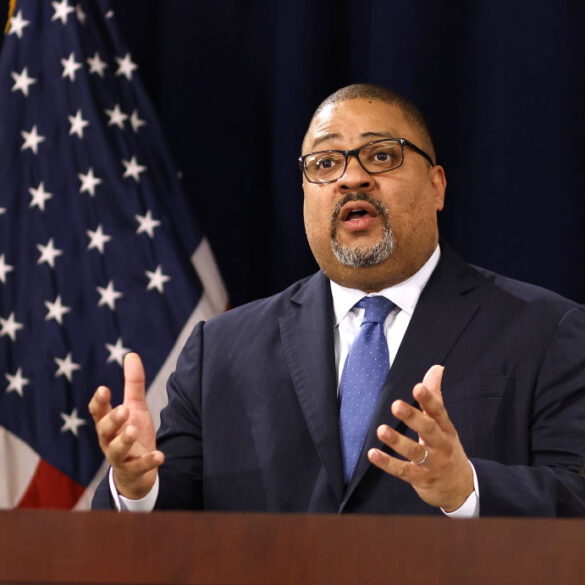Trump attorney asked about roughly three pages worth of records that the attorney claimed Mr. Bragg’s office had deleted.

Manhattan District Attorney Alvin Bragg speaks during a press conference following the arraignment of former U.S. President Donald Trump April 4, 2023 in New York City. (Photo by Kena Betancur/Getty Images)

By Tom Ozimek
A paralegal from Manhattan Attorney General Alvin Bragg’s office testified on Friday during former President Donald Trump’s “hush money” trial that some phone call records between Michael Cohen and Stephanie Clifford’s (a.k.a. Stormy Daniels) lawyer were deleted, raising questions about evidentiary integrity.
In a bid to challenge some of the evidence being put forward in President Trump’s business records falsification trial in Manhattan, Trump attorney Emil Bove asked paralegal Jaden Jarmel-Schneider in court on May 10 about roughly three pages worth of records that the attorney claimed Mr. Bragg’s office had deleted.
Mr. Jarmel-Schneider confirmed some deletions. He acknowledged that some phone call records from 2018 between Mr. Cohen and Keith Davidson (Ms. Clifford’s lawyer) had been deleted, along with some records of conversations between Ms. Clifford’s manager Gina Rodriguez and then-National Enquirer editor Dylan Howard about Ms. Clifford’s claim that she had an affair with President Trump.The Trump attorney alleged that the deletions were “significant,” prompting Mr. Jarmel-Schneider to dispute that characterization, though he acknowledged that some of the records had indeed been deleted.
Prosecutors have submitted the call records into evidence in a bid to bolster their case that the alleged affair—which President Trump has denied—took place and that the former president falsified business records to conceal payments allegedly made to Ms. Clifford to stay silent.
President Trump has denied any wrongdoing and maintains the case is a politically motivated bid to undermine his 2024 presidential campaign.
The fact that prosecutors submitted the call records into evidence but didn’t tell the Trump defense team that some of them had been deleted raises questions about the integrity of the proceedings, according to Trump attorneys, and others.
“Insanity! How on earth is this not a felony committed by Bragg and his minions? It sure would be if team Trump did it,” the former president’s eldest son, Don Trump Jr., said in a post on X.
Mr. Trump Jr. was presumably referring to the fact that evidence tampering is a class E felony in the state of New York.
Mr. Bragg’s office did not respond to a request for comment on the deleted records.
The development comes at the tail end of an intense week that saw President Trump subjected to gag order sanctions, two failed attempts by the defense team to have a mistrial declared, and Ms. Clifford taking the stand.
Mr. Cohen is eected to take the stand next week.
Trial End in Sight
After four weeks in court, prosecutors signaled that the first-ever criminal trial of a former U.S. president will be coming to an end.
Jurors will soon have to decide whether prosecutors have proved beyond a reasonable doubt that President Trump was involved in falsifying business records as part of a scheme to influence the 2016 election.
President Trump was charged by Mr. Bragg with 34 counts of falsifying business records. Typically, this is a misdemeanor charge, but in this case prosecutors allege the records were falsified to cover up a scheme to influence the 2016 election and therefore amounts to a felony.
A number of legal experts have challenged the way Mr. Bragg elevated the misdemeanor into a felony. This includes retired Harvard law professor Alan Dershowitz, who argued that Mr. Bragg was operating on an invalid legal premise because he invoked federal statutes over which New York has no jurisdiction.
Mr. Dershowitz also recently said that he believes that Mr. Bragg’s office has violated voters’ rights with the Trump prosecution, with the legal scholar arguing that the case amounts to a criminal conspiracy to influence elections.
Prosecuting attorney Joshua Steinglass said Friday that prosecutors plan to call just two more witnesses and that it’s “entirely possible” that the prosecution will rest its case at the end of next week.
Mr. Cohen, who is set to testify next week, made the original claims that led to the case. Specifically, the allegation of falsified business records pertains to 11 checks Mr. Cohen received and their corresponding invoices and vouchers.
The defense team says that Mr. Cohen was paid attorney’s fees, while prosecutors allege that the legal expense categorization of the payments was fraudulent in order to cover up that they were meant to buy Ms. Clifford’s silence about the alleged affair.
Ms. Clifford testified over the course of two days, with attorneys and the judge expressing some frustration that she frequently responded to questions with commentary that did not directly answer the question.
Defense attorneys moved for a mistrial, arguing that her statements were “extremely prejudicial” and would improperly influence the jury.
The judge denied that motion.